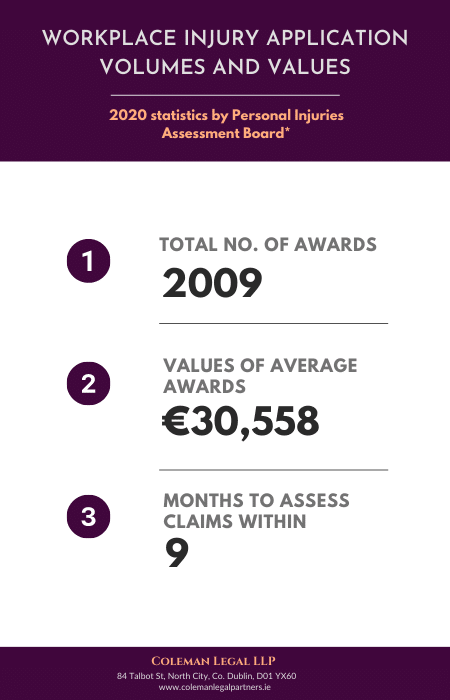Jeffrey Donaldson, former DUP leader, has appeared at Newry Magistrates’ Court to respond to charges of historical sexual offences.

As a result of the Covid19 outbreak, many employees are now working from home. In the case that you were to have an accident at home whilst working, our experienced solicitors will be able to give you clear and independent legal advice on your working from home legal rights.
Under the Health, Safety, and Welfare Act 2005 (Amended), your employer still has a responsibility to take reasonable care for your safety, health, and welfare at work, even when you are working from home. The employer has a duty to ensure the safety, health, and welfare of the employee that is reasonably practicable, regardless of the location the employee is working in. However, the extent of this duty would be limited due to the lack of control your employer has over your home.
As you would have more control over your home, there is a significant duty upon you to also look after your own safety. However, your employer is obligated to provide the equipment and skills for you to work safely while also maintaining the tools and equipment that you need to carry out your work.
Whilst working from home, employees also have a duty to take reasonable care of themselves and others who may be affected by the work they are doing.
These responsibilities include:
The extent of the duty of care would depend on the type of work you are carrying out at home. Your employer is obligated to conduct a risk assessment of the work that will be carried out in the home environment and consider whether your work is suitable to do in your home generally.
If the work is suitable to be carried out at home, then your employer must now consider whether your specific home is suitable for you to work in and carry out your tasks.
For example, if you are required to work from your laptop for a long time, do you have a clutter-free and well-lit space to carry out your work? Or if you were making products at homes, such as clothes or toys, your employer could be expected to consider whether you have enough space to make and store the products and whether you have the appropriate and safe equipment in your home to carry out the task without the risk of objects falling on you or causing you to trip or fall or sustaining an injury from defective tools and equipment.
It is unlikely that an employer would be expected to visit your home to carry out an inspection, although in some cases, it might be necessary depending on the nature of your profession. Typically, the employer would discuss the appropriate safety measures with the employee.
Our workplace injury solicitors are experts in advising clients on how to make these claims. Many people use a solicitor to aid with this application process as a lot of paperwork and filing are required, and our expert team is on hand to make the process as smooth as possible.
The next step is to make an application to the Personal Injuries Assessment Board (PIAB). If your personal injury claim concerns anything other than medical negligence, some assaults, and some cases of entirely psychological injury, then your claim can be brought through PIAB. Examples of claims that PIAB covers include:
Your solicitor will obtain evidence, medical reports, and other expert reports required. And submits these documents to the Board for Assessment.
Once the application is made, PIAB issue a formal notification of claim to the defendant(s). The defendant(s) must indicate within 90 days whether or not they consent or not to the assessment of the claim. If the defendant consents, then PIAB will proceed to assess the claim. If they decline to have the case assessed, the PIAB will issue an Authorisation to allow the claimant to issue court proceedings.
If PIAB is assessing the claim, this will usually take about 9 months. They will then issue their Assessment of your claim, this amount reflects general and special damages awarded in respect of your claim. If the Assessment is accepted by both parties, the PIAB will issue an Order to Pay. The Order to Pay has the same status as an Order of the Court, and must be discharged by the defendant(s) within 10 days. A settlement cheque will then be issued to the claimant.
If the Assessment is rejected by either party, an Authorisation will be granted by PIAB to bring court proceedings.
How much compensation you receive for an accident in the workplace is dictated by two legally binding documents known as:
The “Book of Quantum” and
The recently published Personal Injuries Guidelines by the Judicial Council of Ireland.
The Book of Quantum dictates how much compensation you are owed if your Authorisation was received from PIAB prior to the 21st of April 2021. In all other cases, compensation in respect of general damages is assessed with the aid of the Judicial council’s Personal Injuries Guidelines.
The Book of Quantum sets out general guidelines as to the amounts that may be awarded or assessed in Personal Injury Claims. The guidelines are divided into sections depending on what category of injury was suffered, e.g., head injuries, neck injuries, back injuries and spinal fractures, upper limb injuries, lower limb injuries, and body and internal organs. The Book of Quantum sets out 4 steps to assess what compensation is appropriate for the suffered injury. These steps are as follows:
The Personal Injuries Guidelines were adopted by The Judicial Council on the 6th of March 2021. Similar to the Book of Quantum, this legal document sets out guidelines for assessing compensation in respect of general damages. The general principles for this assessment centre on three criteria:
One of the most substantial differences brought about by this update is that the average level of damages awarded has been reduced. The new guidelines have, however, provided more detail and more explanation for claimants, which is overall a welcomed change to the process of making a personal injury claim.

Employers’ responsibilities to workers have evolved over the years in the civil courts, and the employer’s duty of care to each of his employees can be reduced to five headings.
Put simply, the employer must provide:
All claims involving accidents in the workplace (employer liability cases) must be submitted to Personal Injuries Assessment Board before starting legal proceedings.
Employers must ensure the minimum health and safety standards in order to prevent (as much as possible) their employees from being injured due to an accident at work.
Under the Safety, Health and Welfare at Work Act, 2005, employers have a duty to ensure their employee’s safety, health, and welfare at work as far as is reasonably practicable.
In order to prevent workplace injuries and ill health, you are required, among other things, to

If you have experienced injury or an accident in the workplace and have questions surrounding the incident, please contact our workplace injury solicitors at Coleman Legal to find out if you have a potential legal action against your employer. Our dedicated team has a collective experience of over 30 years, and we are ready to advise and assist you with your claim.
If you want to take legal action over an injury, you should consult our accidents in the workplace solicitors, who are members of the Law Society’s injury accreditation scheme and clinical negligence accreditation scheme. Contact Rose Sweeney or Philip Treacy by email or FREE phone us on 1800-844-104 to see how we can help you in relation to your injury or accident in the workplace.
Solicitors
84 Talbot Street, Dublin 1
D01 YX60
Free Phone: (1800)844104
Fax: (01) 5312727
Email: [email protected]
Web: www.colemanlegal.ie
Online Enquiry Form: Apply
Tell us about your case

Head of Client Services
P: 1800-844-104
E: [email protected]
”At Coleman Legal, excellence in customer care is paramount. We aim to meet both prospective and existing client’s needs in a professional, engaging, and friendly manner with a clear objective to give quality legal advice and reach a positive outcome.”